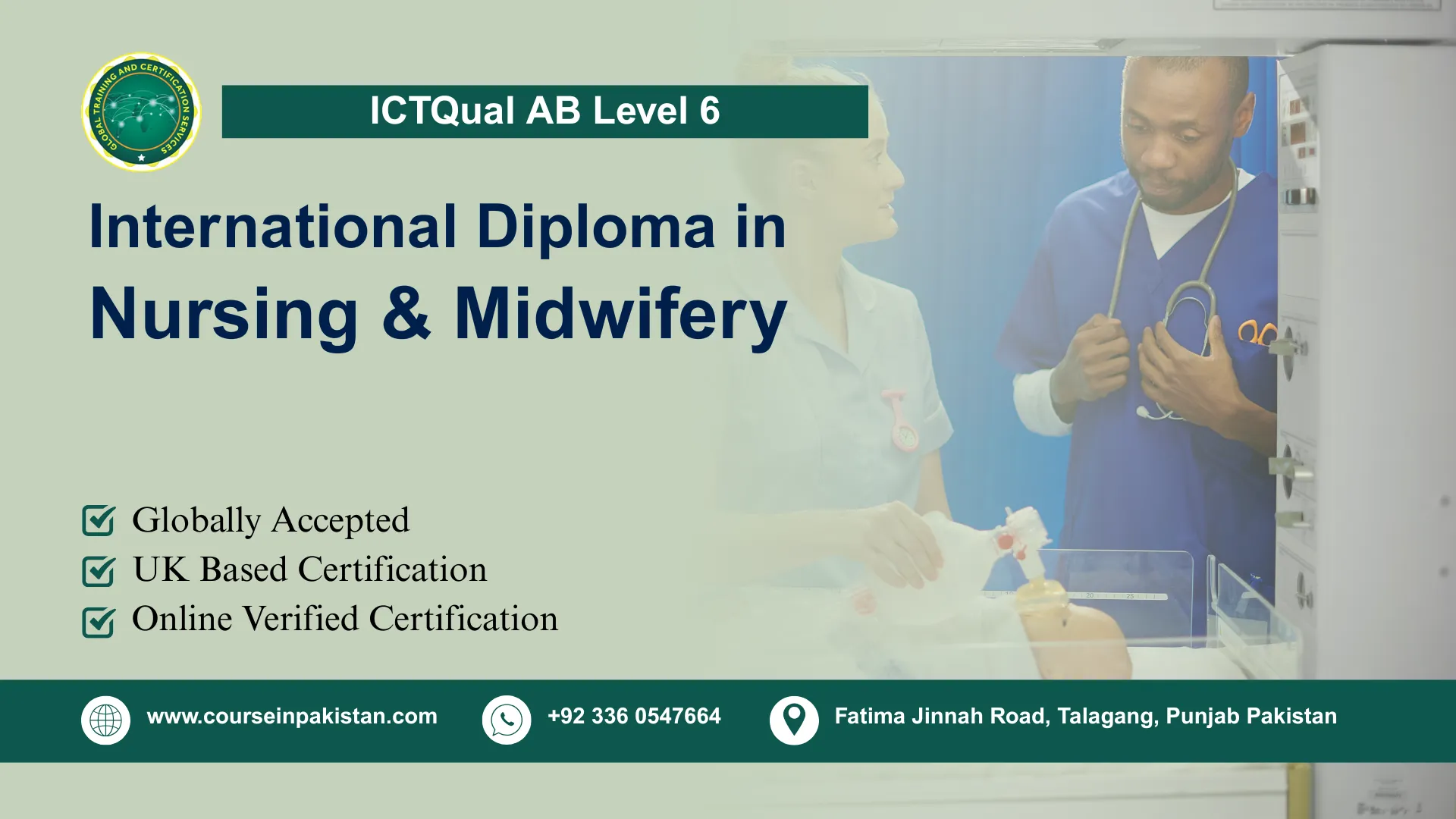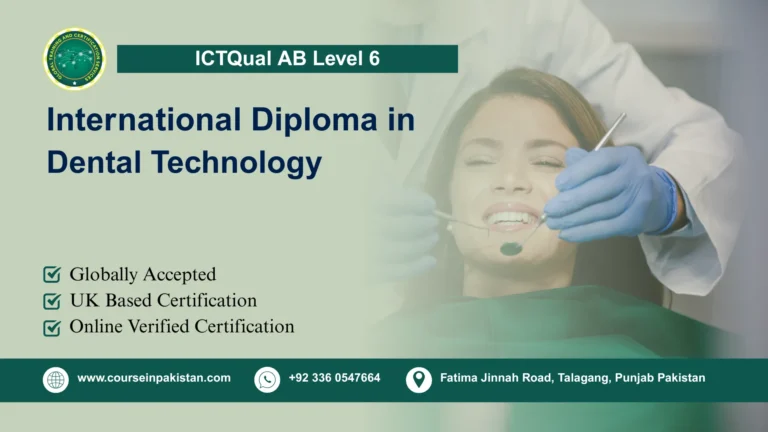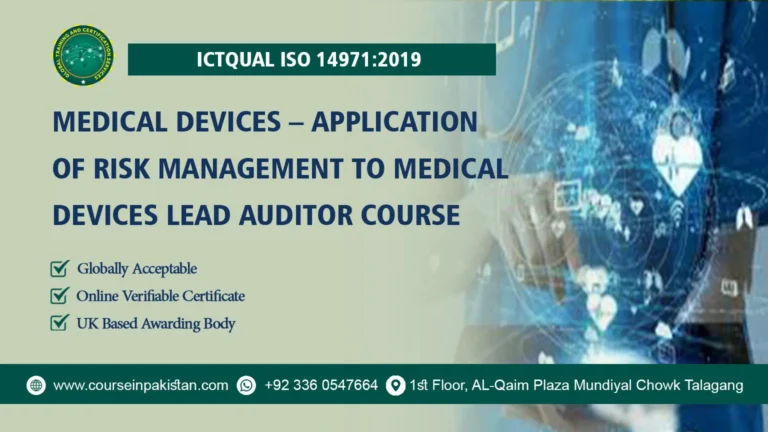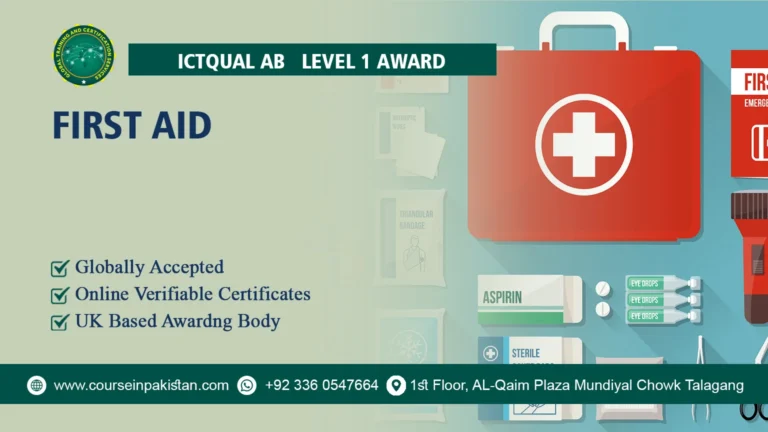
This diploma also emphasizes leadership, critical thinking, and professional development within the healthcare sector. Graduates will be equipped to manage patient care efficiently, collaborate with multidisciplinary teams, and implement best practices in nursing and midwifery. The program is ideal for individuals seeking to advance their careers in healthcare, take on specialist roles, or contribute to improving healthcare outcomes in hospitals, clinics, and community health services.
The ICTQual AB Level 6 International Diploma in Nursing & Midwifery is designed for aspiring nurses, midwives, and healthcare professionals who want to develop advanced knowledge and practical skills in patient care. This comprehensive program provides learners with in-depth understanding of nursing practices, maternal and child health, patient assessment, and evidence-based care strategies. Participants will gain expertise in both theoretical and practical aspects of healthcare, preparing them to deliver safe, effective, and compassionate care in diverse clinical settings.
Course Overview
The ICTQual AB Level 6 International Diploma in Nursing & Midwifery is a 360-credit, fully assignment-based qualification that allows learners to study independently at their own pace from anywhere in the world. This internationally recognized certification is British Council verifiable, MOFA and Embassy attestable, making it highly suitable for employment opportunities and Iqama approval. The program provides comprehensive theoretical knowledge and practical skills across nursing practice, midwifery, clinical care, patient safety, health promotion, mental health, and healthcare management, preparing learners for professional roles in hospitals, clinics, community health centers, and global healthcare organizations.
Fresh students are required to complete all 36 mandatory assignments within three years, gaining in-depth expertise in nursing and midwifery practice, clinical assessments, and patient-centered care. Experienced professionals can pursue this certification by submitting verifiable six years of relevant experience and demonstrating their knowledge through professional discussion meetings with an ICTQual AB approved assessor, allowing them to achieve the qualification in a shorter period without completing all assignments. This flexible, assignment-based structure ensures accessibility for learners at all stages while providing a globally recognized credential that enhances career prospects, professional credibility, and opportunities in nursing and midwifery worldwide.
Key Highlights of the Course:
- Comprehensive training in advanced nursing and midwifery practices
- Hands-on clinical experience in hospitals and community health settings
- Develop skills in patient assessment, care planning, and healthcare management
- Focus on healthcare ethics, patient safety, and evidence-based practices
- Prepare for leadership and specialist roles in nursing and midwifery
Course Benefits
1. Career Advancement
- Access to professional roles in nursing, midwifery, and healthcare management
- Prepare for senior, specialist, and leadership positions in clinical and community healthcare
2. Practical Skill Development
- Gain hands-on experience with patient care, clinical procedures, and healthcare technologies
- Apply evidence-based practices to ensure high-quality patient outcomes
3. Industry-Recognized Qualification
- Internationally accredited and verifiable diploma
- Enhance employability in hospitals, clinics, maternity centers, and global healthcare institutions
4. Leadership and Professional Growth
- Develop communication, teamwork, and leadership skills essential for healthcare professionals
- Learn to manage healthcare teams and coordinate patient care effectively
5. Contribution to Community Health
- Equip learners to promote maternal, neonatal, and patient well-being
- Support sustainable healthcare practices and community health initiatives
Course Study Units
This qualification, the ICTQual AB Level 6 International Diploma in Nursing & Midwifery 360 Credits – Three Years, consists of 36 mandatory units.
Year 1: Foundational Knowledge
- Introduction to Nursing and Midwifery Practice
- Fundamentals of Human Anatomy and Physiology
- Principles of Microbiology and Infection Control
- Foundations of Pharmacology and Medication Safety
- Professional Ethics and Legal Frameworks in Healthcare
- Communication Skills for Healthcare Professionals
- Health Promotion and Public Health Basics
- Psychology and Sociology in Healthcare
- Nutrition, Dietetics, and Patient Wellbeing
- Basic Clinical Skills and Patient Care Techniques
- First Aid and Emergency Response in Healthcare
- Introduction to Research and Evidence-Based Practice
Year 2: Intermediate Proficiency
- Adult Nursing and Clinical Care
- Maternal Health and Midwifery Principles
- Child and Adolescent Health Nursing
- Mental Health Nursing and Psychiatric Care
- Community Health Nursing and Primary Care
- Pathophysiology and Clinical Diagnostics
- Advanced Pharmacology and Therapeutics
- Infection Prevention and Control in Healthcare Settings
- Health Assessment and Clinical Decision Making
- Nursing Informatics and Digital Healthcare Systems
- Leadership and Teamwork in Healthcare Practice
- Applied Research Methods in Nursing and Midwifery
Year 3: Advanced Specialization and Application
- Advanced Adult Nursing and Critical Care
- Midwifery Practice: Labour, Delivery, and Postnatal Care
- Paediatric and Neonatal Nursing
- Geriatric Nursing and Palliative Care
- Advanced Mental Health and Counselling in Nursing
- Global Health Issues and Healthcare Policy
- Advanced Clinical Skills and Patient Safety
- Healthcare Management and Leadership Strategies
- Quality Improvement and Risk Management in Healthcare
- Professional Development and Reflective Practice in Nursing
- Dissertation / Research Project in Nursing & Midwifery
- Clinical Placement / Practical Competency Assessment
Learning Outcomes
Year 1 – Foundational Knowledge
1. Introduction to Nursing and Midwifery Practice
- Understand the roles and responsibilities of nurses and midwives
- Describe the history, scope, and professional standards of nursing and midwifery
- Apply foundational principles of patient-centered care
2. Fundamentals of Human Anatomy and Physiology
- Describe the structure and function of human body systems
- Explain physiological processes essential to health and disease
- Apply anatomical knowledge to clinical nursing practices
3. Principles of Microbiology and Infection Control
- Understand microorganisms and their impact on human health
- Apply infection prevention and control measures in healthcare settings
- Evaluate strategies to reduce healthcare-associated infections
4. Foundations of Pharmacology and Medication Safety
- Understand basic pharmacological principles and drug classifications
- Apply safe medication administration practices
- Recognize potential drug interactions and adverse effects
5. Professional Ethics and Legal Frameworks in Healthcare
- Understand ethical principles and legal obligations in healthcare practice
- Apply professional codes of conduct and patient rights
- Evaluate ethical dilemmas and make informed decisions in clinical settings
6. Communication Skills for Healthcare Professionals
- Demonstrate effective verbal and non-verbal communication with patients and colleagues
- Apply active listening and empathy in patient interactions
- Document patient care accurately and professionally
7. Health Promotion and Public Health Basics
- Understand principles of health promotion and disease prevention
- Apply strategies to improve public health outcomes
- Educate patients and communities on healthy lifestyles
8. Psychology and Sociology in Healthcare
- Understand psychological and sociological factors affecting patient care
- Apply behavioral and social principles to support patient wellbeing
- Recognize mental health issues and social determinants of health
9. Nutrition, Dietetics, and Patient Wellbeing
- Assess nutritional needs for diverse patient populations
- Apply dietary principles to promote health and recovery
- Understand the role of nutrition in preventing and managing disease
10. Basic Clinical Skills and Patient Care Techniques
- Perform fundamental nursing and midwifery procedures safely
- Monitor vital signs and provide routine patient care
- Apply infection control and hygiene protocols in clinical practice
11. First Aid and Emergency Response in Healthcare
- Respond effectively to medical emergencies and first aid situations
- Apply CPR, wound management, and basic life support techniques
- Prioritize patient safety during emergency interventions
12. Introduction to Research and Evidence-Based Practice
- Understand research principles and methodologies in nursing
- Interpret evidence to inform clinical decision-making
- Apply evidence-based practices to improve patient outcomes
Year 2 – Intermediate Proficiency
13. Adult Nursing and Clinical Care
- Provide comprehensive care for adult patients with common health conditions
- Apply clinical assessment and monitoring techniques
- Develop individualized care plans based on patient needs
14. Maternal Health and Midwifery Principles
- Understand prenatal, antenatal, and postnatal care practices
- Support safe childbirth and maternal wellbeing
- Apply midwifery principles to promote healthy outcomes
15. Child and Adolescent Health Nursing
- Assess and manage healthcare needs of children and adolescents
- Implement developmentally appropriate nursing interventions
- Promote health education and preventive care in younger populations
16. Mental Health Nursing and Psychiatric Care
- Recognize mental health disorders and their impact on patients
- Apply therapeutic communication and psychiatric care techniques
- Implement interventions to support mental health and wellbeing
17. Community Health Nursing and Primary Care
- Understand the principles of community and public health nursing
- Conduct health assessments and screenings in community settings
- Implement primary care interventions to improve population health
18. Pathophysiology and Clinical Diagnostics
- Understand disease mechanisms and pathophysiological processes
- Apply diagnostic methods to identify health conditions
- Interpret laboratory and clinical findings to support care planning
19. Advanced Pharmacology and Therapeutics
- Apply advanced pharmacological principles in clinical practice
- Evaluate therapeutic interventions and medication regimens
- Monitor patient responses and manage side effects effectively
20. Infection Prevention and Control in Healthcare Settings
- Implement advanced infection prevention strategies
- Conduct risk assessments for infection control
- Develop protocols to maintain safe clinical environments
21. Health Assessment and Clinical Decision Making
- Conduct comprehensive patient assessments
- Analyze clinical data to inform care decisions
- Prioritize interventions based on patient condition and risk factors
22. Nursing Informatics and Digital Healthcare Systems
- Utilize electronic health records and digital healthcare tools
- Apply informatics to improve patient care and documentation
- Understand data privacy, security, and ethical considerations in healthcare IT
23. Leadership and Teamwork in Healthcare Practice
- Develop leadership and collaborative skills within healthcare teams
- Manage conflict and coordinate multidisciplinary team activities
- Promote professional standards and effective team communication
24. Applied Research Methods in Nursing and Midwifery
- Conduct applied research to investigate clinical questions
- Analyze research findings and apply them to practice
- Evaluate evidence to improve patient outcomes and service delivery
Year 3 – Advanced Specialization and Application
25. Advanced Adult Nursing and Critical Care
- Manage complex adult patient cases in critical care settings
- Apply advanced monitoring and life-support techniques
- Develop care plans for high-acuity patients
26. Midwifery Practice: Labour, Delivery, and Postnatal Care
- Provide expert care during labour, delivery, and postpartum periods
- Monitor maternal and fetal wellbeing
- Apply evidence-based interventions to ensure safe childbirth
27. Paediatric and Neonatal Nursing
- Deliver specialized care for newborns and pediatric patients
- Monitor growth, development, and health outcomes
- Apply interventions to support recovery and prevent complications
28. Geriatric Nursing and Palliative Care
- Assess and manage health needs of elderly patients
- Provide compassionate care in palliative and end-of-life settings
- Promote dignity, comfort, and quality of life for older adults
29. Advanced Mental Health and Counselling in Nursing
- Implement advanced psychiatric care and counselling techniques
- Support patients with complex mental health conditions
- Collaborate with multidisciplinary teams for holistic care
30. Global Health Issues and Healthcare Policy
- Understand international health challenges and policies
- Analyze global health trends and their impact on practice
- Apply policy knowledge to improve healthcare delivery and outcomes
31. Advanced Clinical Skills and Patient Safety
- Perform complex clinical procedures with accuracy and safety
- Implement patient safety protocols in all clinical interventions
- Evaluate outcomes to ensure effective and safe care delivery
32. Healthcare Management and Leadership Strategies
- Develop strategic management skills for healthcare settings
- Lead teams and manage resources effectively
- Apply leadership principles to improve organizational performance
33. Quality Improvement and Risk Management in Healthcare
- Implement quality improvement initiatives in clinical practice
- Conduct risk assessments and manage clinical hazards
- Promote safe, efficient, and high-quality patient care
34. Professional Development and Reflective Practice in Nursing
- Engage in continuous professional development and reflective practice
- Evaluate personal strengths and areas for improvement
- Apply reflective learning to enhance clinical competence
35. Dissertation / Research Project in Nursing & Midwifery
- Conduct an independent research project in nursing or midwifery
- Apply research methodology to investigate a clinical question
- Present findings through structured reports and professional presentations
36. Clinical Placement / Practical Competency Assessment
- Demonstrate practical competence in real healthcare environments
- Apply theoretical knowledge to patient care under supervision
- Evaluate performance and integrate feedback for professional growth
Who is This Course For?
The ideal learner for this course is someone who:
- Has a strong passion for nursing, midwifery, and patient care
- Seeks to advance their career in healthcare, hospitals, clinics, or community health
- Wants to develop advanced clinical skills, leadership, and decision-making abilities
- Desires to gain expertise in maternal, child, adult, geriatric, and mental health care
- Is motivated to implement evidence-based practices and improve healthcare outcomes
Future Progression
Graduates of this course can pursue:
- Senior nursing and midwifery roles in hospitals, maternity units, and healthcare organizations
- Specialized positions such as Nurse Manager, Midwife Consultant, Pediatric or Critical Care Nurse
- Opportunities in healthcare leadership, administration, and policy development
- Roles in community health, public health programs, or international healthcare initiatives
- Advanced research, consultancy, or academic positions in nursing and midwifery
Academic Pathways:
- Learners completing this diploma may continue to:
- Postgraduate diplomas in Nursing, Midwifery, Public Health, or Healthcare Management
- Professional certifications in Critical Care, Neonatal Care, Mental Health Nursing, or Midwifery Specializations
- Master’s programs in Clinical Leadership, Healthcare Policy, or Patient Safety
- Research-based programs or PhD studies in nursing, maternal health, and healthcare innovations
Conclusion
The ICTQual AB Level 6 International Diploma in Nursing & Midwifery equips learners with the knowledge, clinical skills, and professional competencies required to excel in modern healthcare. Graduates emerge as confident, skilled professionals capable of delivering high-quality patient care, leading healthcare teams, and implementing best practices across diverse healthcare settings. This internationally recognized qualification enhances career opportunities, fosters leadership, and empowers learners to contribute meaningfully to improving healthcare standards globally.






